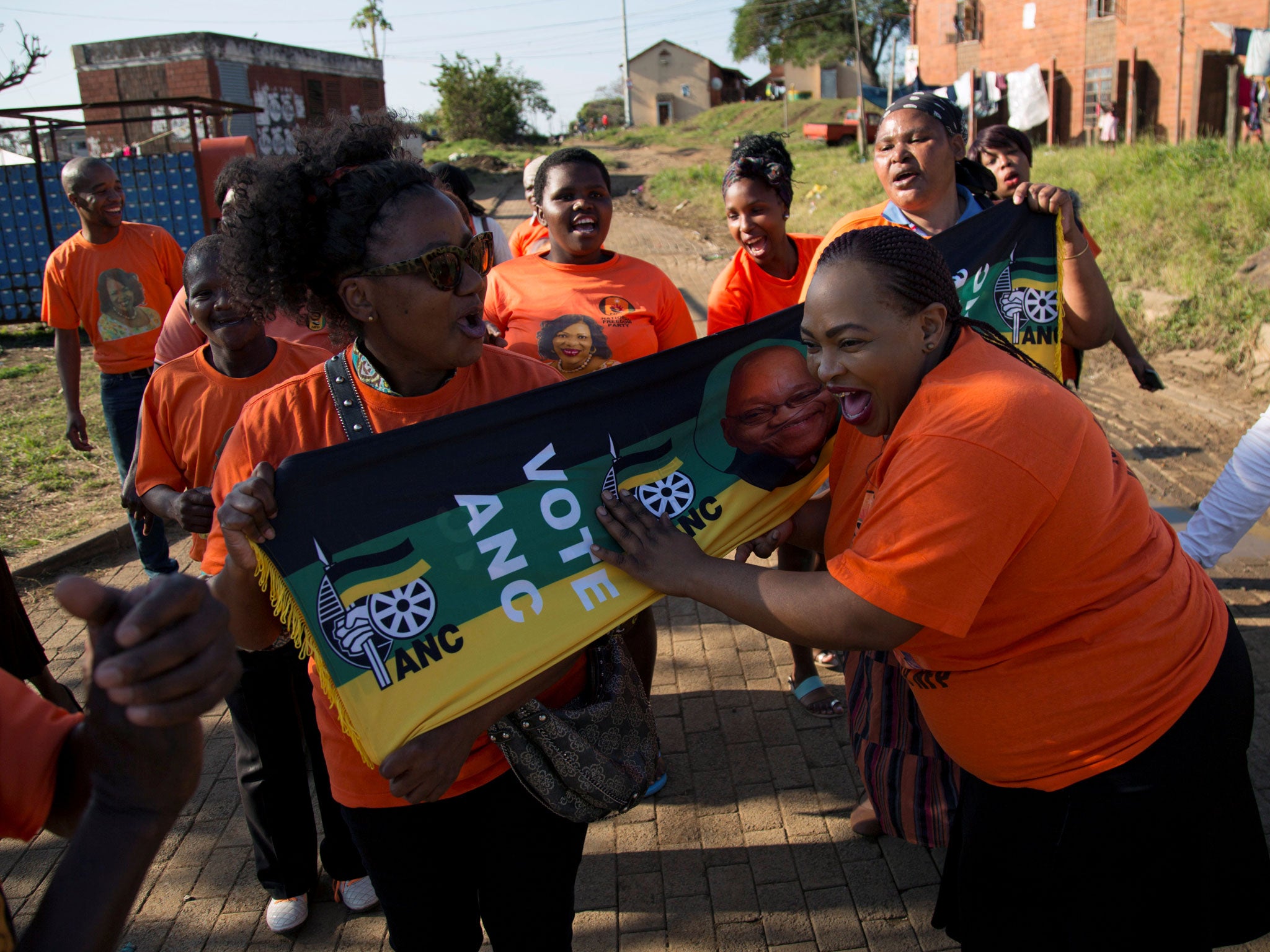South Africa elections: Ruling ANC party ‘could lose major cities’ with strong opposition showing
The party has dominated the country’s politics since 1994, but high unemployment and a spate of violence has left the ANC vulnerable

South Africa's ruling party could lose control of major cities – areas it has held virtually unchallenged for two decades – in municipal elections on Wednesday, thanks to a strong challenge from opposition groups seeking to capitalise on scandals linked to President Jacob Zuma.
The ruling African National Congress (ANC), formerly the main anti-apartheid movement, has dominated South African politics since the first all-race elections in 1994. However, it has seen some erosion of support from South Africans who say their hopes for jobs and other opportunities have not been fulfilled since the end of white minority rule. The South African economy has stagnated since the global financial crisis in 2008.
If the ANC loses major cities in the elections, it could reshape the political playing field ahead of the 2019 general election, and may also embolden President Zuma's rivals within the party to challenge him.
“The ANC is in danger of losing big cities” and has increasingly been falling back on rural support, said Daryl Glaser, an associate professor of politics at Wits University in Johannesburg. He anticipated, however, that opposition parties might not win majorities even if they do well, forcing them to decide whether to form ruling coalitions despite differences that are extreme in some cases.
Even leaving aside any potential political upheaval, the municipal election season has been deadly for candidates and party activists, with more than 12 killed ahead of Wednesday's vote.
President Zuma's office has urged that the municipal elections remain peaceful, and campaigning in many parts of the country has been calm.
Many of the political killings this year have not been in such contested areas, instead occurring in the traditional ANC stronghold of KwaZulu-Natal, which has a history of political violence, though national police have determined it a serious enough problem to create a task force to investigate the deaths.
The killings have forced some candidates into hiding, said Nkosikhulule Nyembezi, co-chair of the National Coordinating Forum of community groups that partner with the Electoral Commission on observing and other activities.
One candidate from KwaZulu-Natal told South African media he was shot in the chest last month outside his home and said he had taken refuge about 200 miles away in Johannesburg, where he planned to remain until the elections.
David Mazibuko has said he remains a candidate, even in hiding. He told The Associated Press late last week that he “didn't get anything from detectives” yet on resolving his case.
The opposition Democratic Alliance (DA) party, whose roots lie in white liberal opposition to apartheid decades ago, hopes to make gains in key metropolitan areas controlled by the ruling party, including Johannesburg, Tshwane, which is the greater metropolitan area of the capital, Pretoria, and Nelson Mandela Bay, a municipality on South Africa's east coast. The Democratic Alliance already runs the city of Cape Town.
“In past elections the DA wouldn't dare to come here,” IT graduate Zodwa Twani told Reuters from a rundown township in Port Elizabeth where DA placards line the streets alongside images of President Zuma.
“I loved the ANC but now they only focus on themselves, not the people.[Nelson] Mandela would have been ashamed,” the 25-year old added, standing in a pot-holed street in a ward where the ANC won 80 per cent of the vote five years ago and the DA barely registered.
A more radical opposition party, the Economic Freedom Fighters (EFF), advocates the nationalisation of industry and other measures that it says would help the poor. It is contesting the local elections for the first time. On Sunday, a convoy of vehicles carrying noisy EFF supporters drove past restaurants serving affluent, mostly white clients in the Johannesburg suburb of Parkhurst, reinforcing the party's message that South Africa's white minority should relinquish its hold on economic power.
MPs of the Economic Freedom Fighters have disrupted parliamentary sessions several times to protest a scandal over state upgrades to Mr Zuma's private home. The case went to the Constitutional Court, which said Mr Zuma had violated the constitution and instructed the president to reimburse the state for $507,000 (£380,000). The president has denied any wrongdoing.
A large crowd of ruling party supporters gathered Sunday at a stadium rally in Johannesburg, where Mr Zuma touted his party's record in leading the country for more than two decades. He cited data showing that 95 per cent of South Africans have access to clean, piped water, compared to just over 50 per cent of households in 1994.
“In the past, our people lived in dirty, dusty townships and villages, and many still do,” Mr Zuma said. “The future entails the creation of viable small towns and vibrant metro cities where our people can earn a living.”
Associated Press
Subscribe to Independent Premium to bookmark this article
Want to bookmark your favourite articles and stories to read or reference later? Start your Independent Premium subscription today.

Join our commenting forum
Join thought-provoking conversations, follow other Independent readers and see their replies